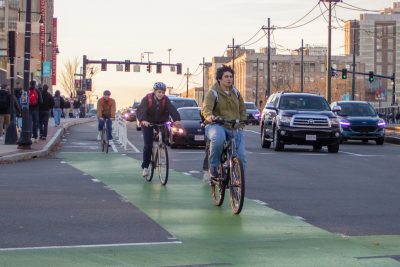Organizations and residents in Cambridge reacted to a new Safety Improvement Project announced on Nov. 14 aiming to install separated bike lanes on Cambridge Street at the beginning of 2024.

In an open house on Wednesday, local organizations expressed that the loss of parking as a result of the expanded bike lanes would negatively impact access to their buildings. Other community members, however, welcomed the expansion, stating it would make the street safer for cyclists and residents.
Elizabeth Petit, a volunteer for Cambridge Bicycle Safety, discussed the importance of the bike safety improvements for students in the area.
“Updated designs will improve visibility, for both cyclists and pedestrians,” Petit said.“[Cambridge St. is] a really important route for high school students that go to Cambridge Rindge and Latin School from East Cambridge.”
Filomena Fitch, owner of Filomena’s Beauty & Hair Salon, said these changes do not consider how the project would affect business owners.
“As they are [making] these changes, they’re not thinking of us business owners, they’re not thinking of this project as a community,” Fitch said. “They’re thinking about this project as people that are driving through our city … they’re not people that are going to stop in our business.”
The improvement project was created to comply with the Cambridge Cycling Safety Ordinance passed in 2020, which requires approximately 25 miles of separated bike lanes to be installed by 2026. It proposes moving bike lanes to be adjacent to the curb, eliminating certain parking spaces, as well as shortening crossing distances for pedestrians and reconstructing existing curb ramps for accessibility, according to the project’s website.
Brooke McKenna, commissioner of Cambridge Transportation, said the city will work with businesses and residents to “identify the best way to regulate the remaining parking.”
“Where there is room, there will then be what we call ‘floating parking’ between the bike lane and the travel lane,” McKenna said. “Where there is no room, there will be separation with white flex posts between the bike lane and the travel lane.”
Highlighting a contentious issue at the meeting, McKenna said “the project will reduce on-street parking by about half.”
Quinton Zondervan, chair of the Cambridge Public Safety Committee and a Cambridge City Councilor, acknowledged the project’s effect on local business owners but emphasized the project’s importance for increasing cyclist “comfort” and pedestrian safety.
“It’s a bit contentious because a lot of the business owners along the route are opposed because of the loss of parking that is associated with these projects,” Zondervan said. “It’s really critically important that we move forward with these projects, and there are mitigations that we’re able to put in place to continue to support our local businesses.”
While many concerns in the meeting revolved around cycling and business concerns, Paulo Pinto, CEO of the Massachusetts Alliance of Portuguese Speakers, said the project may negatively impact elderly clients who come to the center for programs.
“We [need] to have accessible parking and loading zones for the cars dropping the seniors off and picking them up,” Pinto said. “The clients already have a hard time finding parking when they come for appointments. It’s going to be worse because we’re going to lose half the parking.”
This meeting was the first in a series of outreach meetings that are designed to introduce the goals of the project, ask attendees about their experiences with the street, gather feedback on safety concerns and answer questions. The next open house will be Saturday at Millers River Apartments.
McKenna encouraged residents to attend these meetings and become part of the project’s planning.
“I would just love to encourage people to come out and get involved in the design,” McKenna said. “We really need as much feedback from the community as possible.”

















































































































